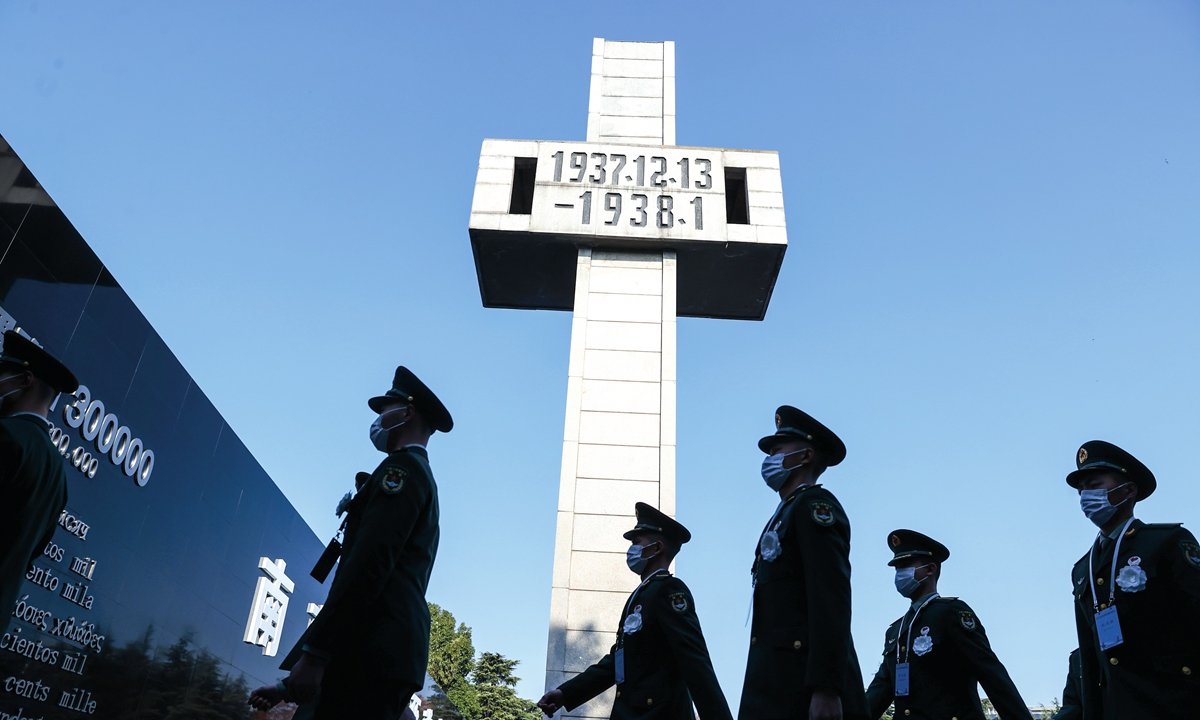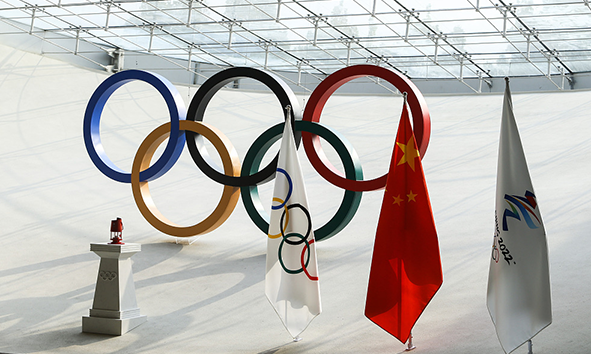
A ceremony is held to commemorate Nanjing Massacre victims on December 13, 2021, the eighth National Memorial Day for the more than 300,000 victims who were brutally killed by Japanese troops after the city was captured by Japanese invaders in 1937. Memorial events were held across China to remember the day. Photo: VCG
On the occasion of China holding nationwide commemoration services on Monday for the victims of the 1937 Nanjing Massacre, Chinese officials warned that Japan's militarism must not be allowed to revive.
While today's Japan appears to pose a growing right-wing threat to its neighbors, and confront China on issues such as defense and ideology, the decision Japanese Prime Minister Fumio Kishida is supposed to make on the upcoming Beijing 2022 Winter Olympics will become a major barometer to evaluate whether Japan, which has left a miserable wartime memory for the Chinese people, would go against its promise of safeguarding the China-Japan friendship or let this relationship veer into a downward spiral, observers said.
The annual memorial ceremony for the Nanjing Massacre victims was held on Monday morning in Nanjing, capital of East China's Jiangsu Province,marking China's eighth National Memorial Day for the more than 300,000 victims who were brutally killed by Japanese troops after the city was captured by Japanese invaders on December 13, 1937.
The Nanjing Massacre was one of the three large-scale massacres of World War II, and there is irrefutable evidence that cannot be altered, Chinese Vice Premier Sun Chunlan said in a speech at the Memorial Hall of the Victims in Nanjing Massacre in Nanjing. The direction of progress can only be grasped by correctly understanding history, she said.
In the spirit of taking history as a mirror and creating the future, we are ready to build China-Japan relations that meet the requirements of the new era, and also to work with all peace-loving people in the world to build an open, inclusive, clean and beautiful world that enjoys lasting peace, universal security and common prosperity, Sun noted.
Although the phone call between Chinese President Xi Jinping and Kishida in October created some positive momentum for bilateral ties, there have been growing uncertainties given growing right-wing thought in Japan, and a possible return to militarism has overshadowed bilateral ties, Chinese experts noted.
From erroneous remarks made by former senior Japanese officials over the Taiwan question, allying with the US in its Indo-Pacific Strategy, stirring up public opinion on the Diaoyu Islands issue, pressuring China over "human rights" and most recently, assembling an unusually large contingent of Japanese lawmakers to visit the infamous Yasukuni Shrine, some Japanese officials, who still have a strong influence in the Kishida administration, have colluded with the US or echoed the US strategy of containing China on multiple fronts.

Beijing Winter Olympics
In another move to contain China, the Biden administration, along with some of its G7 and Five Eyes allies, has been calling on countries to not send diplomatic representatives to the Beijing 2022. But more countries like South Korea have spoken with a rational voice, rejecting the politicization of the Games.
Japan, however, has yet to make any formal decision, as experts see it as being stuck between the US' China strategy and fulfilling its promise to improve China-Japan ties.
Dangerous signals
The brutal massacre that took place 84 years ago in Nanjing should never be forgotten or misrepresented, and Japanese militarism must not be allowed to revive, Zhang Jun, China's permanent representative to the UN, said on Twitter on Monday.
Holding a national memorial service is essential. Even though more than 70 years have passed, some right-wing forces in Japan continue to glorify the atrocities of Japanese officers and soldiers or distort its war history. Whether they see history correctly has become a key factor to decide if militarism will be revived in Japan and if Japan will take a peaceful development path, Liu Jiangyong, vice dean of the Institute of Modern International Relations at Tsinghua University, told the Global Times on Monday.
"Distorting history will mislead the future. Some right-wing politicians in Japan, in addition to the right-wing forces in Japanese society, have been holding a wrong perspective on history and the war. As a result, they help formulate Japan's national strategy or domestic and external policies, which will bring damage," he said.
In the post-WWII era, Japan has faced two different paths in adopting its national strategy - a peaceful development path of safeguarding the post-war constitution by learning the lessons of the history, or seeking to amend the constitution and increasing Japan's defense capabilities and enhancing its alliance with the US, according to experts.
Recently, many factors and moves by Japan have contributed to the tensions between China and Japan, Da Zhigang, director and research fellow of Institute of Northeast Asian Studies at the Heilongjiang Provincial Academy of Social Sciences, told the Global Times on Monday.
Citing recent incidents including a visit by 99 Japanese lawmakers to the Yasukuni Shrine that enshrines Japan's infamous Class-A war criminals who symbolize Japan's war atrocities and militarism during World War II and stronger right-wing forces in Japan, Da warned that the political hype would affect existing goodwill of the Japanese society toward China and erode the foundation of bilateral relations.
In some historical issues, because of the hype by the right-wing forces, more and more Japanese people are inclined to accept the view that Japan was the victim during the war while forgetting their country's sins of aggression, he said.
The right-wing forces are on the rise in Japan and moving in the direction of militarism. Under the banner of safeguarding national security and economic interests, as well as human rights, Japan has followed the US in demonizing and smearing China on many occasions in the international community, the expert said.
Future ties At the G7 meeting held from Friday to Sunday, Japanese Foreign Minister Yoshimasa Hayashi and US Secretary of State Antony Blinken agreed on the need to strengthen their countries' alliance amid a tougher regional security environment, Reuters reported on Saturday. Japanese media outlet NHK also reported that during the meeting, Japan was also deeply concerned about the so-called human rights crises in China's Hong Kong and Xinjiang.
Japan is gravely offensive and insensitive to (the feeling of) every Chinese person when it takes a moral high ground over China out of the so-called concern for human rights when it continues to ignore the atrocities it has committed and refuses to take responsibilities, Tom Fowdy, a British political and international relations analyst, told the Global Times on Monday.
And as another important barometer to evaluate where China-Japan relations are heading, some experts said the upcoming decision by Tokyo on whether to send officials to Beijing 2022 will be crucial.
If Japan decides not to send any government officials to the Winter Games, it shows that it is ultimately subservient to the US and scorns China's goodwill and sincere efforts to improve relations, Fowdy noted.
China and Japan have an important consensus on supporting each other in hosting the Olympic Games, Wang Wenbin, spokesperson of the Chinese Foreign Ministry, told a regular press conference on Thursday. "China gave full support to Japan in hosting the Tokyo Olympics, now it is Japan's turn to show basic good faith," he said.
"If Tokyo decides to send officials to the Games, it could serve as a ballast for future bilateral relations," Da said.





